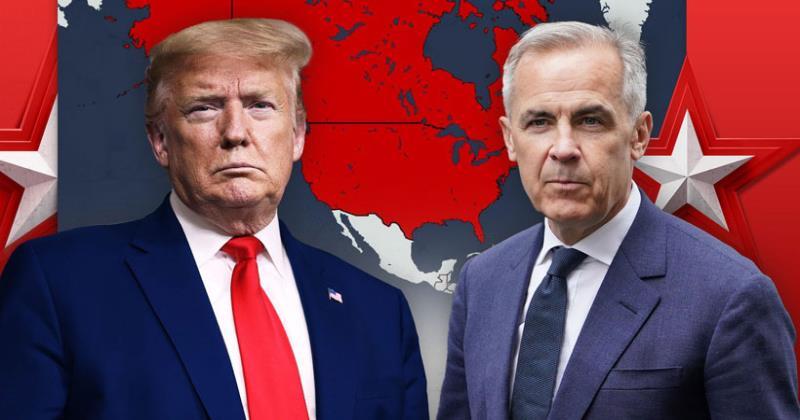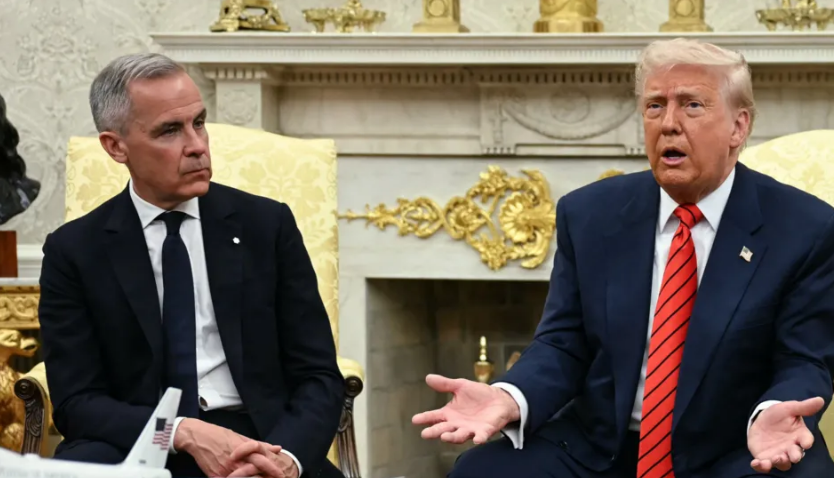In a major reversal, Canadian Prime Minister Mark Carney has announced the cancellation of Canada’s digital services tax (DST) on major U.S. tech firms, following intense pressure from U.S. President Donald Trump. The decision has reopened stalled trade talks between the two nations but sparked sharp political criticism at home.
White House Declares Victory for American Tech

White House Press Secretary Karoline Leavitt confirmed that Carney informed Trump via a phone call on Sunday night that the DST would be dropped. The tax would have imposed a 3% levy on Canadian revenues above C$20 million from U.S. tech giants like Amazon, Meta, Google, and Apple.
“President Trump knows how to negotiate,” Leavitt stated, calling the rollback a “big win for U.S. tech companies and workers.” Trump had suspended trade negotiations and threatened new tariffs on Canada after labelling the DST a “blatant attack” on American innovation.
Canada Drops DST Amid Trade Tensions
On Monday, Finance Minister François-Philippe Champagne confirmed that legislation to eliminate the tax would be introduced, and payments due Monday would no longer be collected. He emphasized that Canada’s original preference was a multilateral agreement to address tech taxation fairly across borders.

The DST, announced in 2020, aimed to capture tax revenue from global tech firms operating in Canada but paying minimal local tax. It was estimated to raise over C$2 billion in its first year, with projections of C$5.9 billion over five years.
Political Fallout in Ottawa
Opposition leader Pierre Poilievre criticized the Carney government’s sudden U-turn. “He put his elbows down,” Poilievre said, referencing Carney’s campaign promise to defend Canada against Trump using the hockey phrase “elbows up.”
Poilievre urged the PM to push the U.S. for removal of softwood lumber tariffs in exchange, saying: “We need gains for Canadian workers.”
Global Context: DST and Tech Giants
Many countries including the UK and France have pursued digital service taxes to ensure large multinationals pay fair shares. These efforts respond to tech firms’ tendency to structure operations in low-tax jurisdictions while profiting globally.
Canada’s now-scrapped DST would have retroactively applied from January 2022, raising concerns among U.S. firms and triggering aggressive U.S. retaliation under the Trump administration.
Trade Talks Restart

Following the tax rollback, White House economic adviser Kevin Hassett confirmed that U.S.-Canada trade negotiations resumed Monday. Commerce Secretary Howard Lutnick also praised the Canadian decision on X (formerly Twitter), calling it a move that removed a “deal-breaker.”
This marks a thaw in tense economic relations between the U.S. and Canada since Trump’s return to office. It remains to be seen how Canada will navigate future tech regulation and trade strategy without undermining its economic sovereignty.
Conclusion

Canada’s decision to drop the digital services tax under U.S. pressure highlights the challenges of regulating global tech in an era of aggressive geopolitics. As Ottawa re-engages in trade talks with Washington, critics argue the government has ceded too much leverage too quickly, while others welcome the reopening of negotiations that could benefit broader economic interests.
For more on ongoing global trade battles, explore global trade news on The Morning News Informer.









